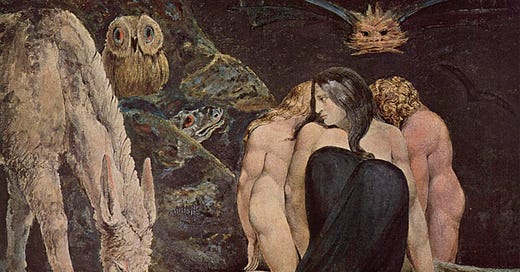Dweller on the Threshold: The United States' Pluto Return PART TWO
Pluto in the second house of the US's Horoscope. Consumerism, mammon, competition, urban sprawl, speed, and greed. Manifest Destiny run amok.
PART TWO of my new PRIVATE REPORT, Dweller on the Threshold: The United States’ Pluto Return, for paid subscribers to WOODRUFF. You’ll find PART ONE here.
CARL JUNG TELLS OF A CONVERSATION he had in 1925 with the chief of the Taos Pueblo in northern New Mexico. The chief, Ochwiay Biano, was describing to Jung the strange Europeans who have come west and invaded his world. He said:
“See how cruel the whites look. Their lips are thin, their noses sharp, their faces furrowed and distorted by folds. Their eyes have a staring expression; they are always seeking something. What are they seeking? The whites always want something; they are always uneasy and restless. We do not know what they want. We do not understand them. We think that they are mad.”
Biano’s impressions unwittingly walk us straight into the second house of the United State’s horoscope—and its lone occupant Pluto.
His words summon the spirit of Manifest Destiny, the ideological mania that impelled the country’s campaign of brutal conquests, diplomatic duplicity, and diaspora—the seeding of the ‘American Dream’ that displaced or destroyed indigenous settlements from coast to coast.
Psychologist James Hillman, in one of his poetic riffs, described the fuel of American hubris (and its forever recurring fever dream), as a lust for:
“Consumerism, mammon, competition, speed, and greed—urban sprawl—cult of the quick, quick fame, quick success, quick fixes.”
Hillman intuited the innocence and arrogance of the dream born of “willful stupidity, willful ignorance”—wasteful and fearful but most of all angry and entitled.
The United States' second house Pluto mirrors this fervor for ‘settler colonialism’—a sprawl that originated with (and was rationalized by) the nation’s already entrenched dependence on slavery; an enterprise firmly established when the colonies were transforming into a nation.
House of Hades
One of the frequent questions I receive from clients—those with a cursory understanding of astrology is: “What in the hell are the houses?”
I try and explain, “Things are happening in the sky, and the houses of the horoscope tell us where it’s playing out for us down here on Earth.”
The origin of the astrological houses is a near-apocryphal mystery. As Deborah Houlding explains in her stellar book The Houses: Temples in the Sky, students shouldn’t associate the houses with numerological values, or the houses’ seeming similarity to the meaning of the signs of the Zodiac.
The houses have a powerful philosophical basis of their own—distinguished and developed through centuries of historical observation and metaphorical application.









